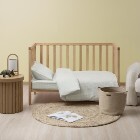The anticipation is finally over, your little bundle has arrived and you are home. Now what?
It’s very normal for parents (especially first time parents) to focus on the ‘big day’, the ‘birth day’ and rightly so, this is such a momentous day. However, once your little baby is here you will quickly realise that the birth is just one part, many would say the ‘easy’ part in comparison to the numerous challenges that the coming years will bring.
The weeks following the arrival of a newborn can be a bit of a haze. It is a time for you and your partner to get to know your new baby, perhaps siblings to get to know their new little brother or sister, finding the rhythm of your newly expanded whānau.
During this time, it’s important to be kind to yourself and remember that your body has just done the most extraordinary thing: regardless of how you gave birth, how long or short your labour was, in the months leading up to this event, your body has grown a human being and deserves enormous kudos - Ka pai rā tēnei mahi.
You now need to go slow, to rest and recover because there will be wounds to heal – both internal and external, physical and emotional. You may be exhilarated beyond belief with your birth experience or you may need to grieve the birth you had envisioned and come to terms with the unexpected way your baby arrived into this world.























